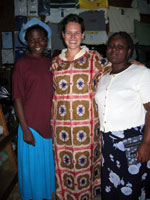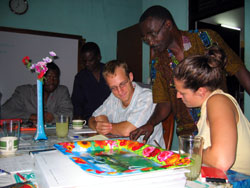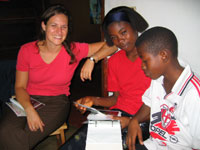|
... Back to main journal page
Thursday, September 25, 2003-09-25
Life in
Togo, West Africa….
Well, things have been good.
So far from most of my experiences, as I was very well prepared,
nothing has been a major shocker. However, I see how little things
are beginning to grate me.
Really, this ‘wearing thin’ sort of happened this evening, as I’m
beginning to get a sense of the frustrations involved in this work,
and the hugeness of the task at hand. Guy Ahialegbedzi, my director
here at Vivre Mieux, is an incredible man. He is a true networker.
I watch him building and maintaining authentic relationships with
all types of people in all villages and countries. He is a trail-blazer
in development work. And he does it all for free. Guy is professionally
trained as a medical assistant, which is basically the closest thing
to a doctor here in Togo, where there is one physician for every
12 000 inhabitants. He founded Vivre Mieux in 1994. It has been
a volunteer-run organization from the start. …..(more on this later)
My impressions of Togo so far haven’t seemed that shocking. I was
very well prepared before arriving, through meeting with people
from Togo, those who had worked here, and reading of the experiences
of other volunteers. When I see something different than at home
(which is actually almost everything, right down to the palm trees),
I simply think “oh, so that’s what that is”. Hence, culture shock
on the larger scale hasn’t been too intense. I don’t feel the desire
to write about all of the funny little quirks that differ from life
in Canada. Those you can read in a book. I need to write about what
I’m living here; it is unique to my own situation, and everyone’s
experience will be different. The implications of the AIDS pandemic
here in Africa are too large to be glossed over. My experience in
these first few weeks in Togo has been raw, exhilarating, intense,
and real (a larger than life kind of reality). I simply cannot limit
myself to which sights I have seen or how cool it is to see people
carrying things on their heads – because my experience has been
so much more than that. It’s as though Life has thrown me right
into the middle of something huge; perhaps I myself chose to dive
in.
 However,
what I am noticing is the little things that make me do a double
take – literally or figuratively – and remind me that I am, actually,
in Africa. Take, for example, technology. Vivre Mieux is quite well
set up with computer hardware and software, relative to most Togolese
NGO’s. Hence, working in this office, seeing the three computers
(2 desktops, 1 laptop), I took this luxury for granted. I also assumed
that they would all function at the level I was used to in an office
in Canada. I have been somewhat mistaken! First of all, I’m slowly
getting the hang of the French keyboard. After struggling through
my first few emails home, I received many replies on how ‘cute’
my typos were. Secondly, sitting down to do some writing to clear
my mind, get down ideas, journal, and write for media coverage of
the projects here, I assumed that my laptop would be functional.
After all, it doesn’t take much to run Microsoft Word. I’m learning
not to assume much of anything here in Togo – in all respects –
because I’m constantly surprised. The memory was slow, and then
the caps-lock key froze; so I moved on to the third computer – a
good, sturdy desktop. Well, electricity in Africa is also something
not to be taken for granted. So Guy has set up alternative power
supplies for the desktop computers. One side effect of this is that
sometimes the power runs low; thus, at this point in time, I’ve
been writing through many loud beeping and high pitched tones, as
the generator does its thing… However,
what I am noticing is the little things that make me do a double
take – literally or figuratively – and remind me that I am, actually,
in Africa. Take, for example, technology. Vivre Mieux is quite well
set up with computer hardware and software, relative to most Togolese
NGO’s. Hence, working in this office, seeing the three computers
(2 desktops, 1 laptop), I took this luxury for granted. I also assumed
that they would all function at the level I was used to in an office
in Canada. I have been somewhat mistaken! First of all, I’m slowly
getting the hang of the French keyboard. After struggling through
my first few emails home, I received many replies on how ‘cute’
my typos were. Secondly, sitting down to do some writing to clear
my mind, get down ideas, journal, and write for media coverage of
the projects here, I assumed that my laptop would be functional.
After all, it doesn’t take much to run Microsoft Word. I’m learning
not to assume much of anything here in Togo – in all respects –
because I’m constantly surprised. The memory was slow, and then
the caps-lock key froze; so I moved on to the third computer – a
good, sturdy desktop. Well, electricity in Africa is also something
not to be taken for granted. So Guy has set up alternative power
supplies for the desktop computers. One side effect of this is that
sometimes the power runs low; thus, at this point in time, I’ve
been writing through many loud beeping and high pitched tones, as
the generator does its thing…
It is also the tiny little positive surprises that are such a joy;
such as learning that in Microsoft Word, when I press the Language
key to English, not only does it allow me to type without the dictionary
underlining every word as a spelling mistake, but also, it changes
the keyboard back to a standard English keyboard! Wow! Was I overjoyed!
Tim, the other Crossroader, really could relate!
Feeling
needed; finding my purpose
 It
is these little things that grab my attention when I forget my purpose
here: which is really only to be helpful and to serve in whatever
way presents itself. It
is these little things that grab my attention when I forget my purpose
here: which is really only to be helpful and to serve in whatever
way presents itself.
And already I see so much where I am needed. I see where my counseling
training can and will be used and I am so excited. When I was shown
my own office, I realized that this was my very first desk! My ideas
are flowing, and they are appreciated and needed, and I have so
much liberty to forge ahead with projects to be implemented. There
is a lot of energy in this organization, and it is this I wish to
cling to, in those moments where the mountain seems too big, and
the task of moving each tiny grain of sand feels too daunting.
Facing
the realities of AIDS in Africa
During my first week of work at Vivre Mieux I met with my first
“client” for my first “counseling session”. What a thrill to be
finally doing work that I love and have dreamt of. Flora is a woman
who’s partner recently died of AIDS. She is also infected with the
HIV virus. We spoke generally of her knowledge and understanding
of the epidemiology of the infection, and more specifically about
the issues faced by women living with HIV.
After questions about her health and social status, she began asking
me questions, and her real concerns came to the fore. She is a single
woman, in her thirties. Her dream is to have children. She was in
a relationship with a lover which she hoped would lead to marriage;
instead, betrayal, pain, illness, and death were the result. She
said that she had never been with anyone other than this man. She
was faithful; so how is it that she has HIV? Now that she too is
infected, she fears that her dreams to marry and have babies are
over. ‘And what else is there to live for?’ she asks me. I explained
to her that a positive test result is not a death sentence. People
can live for years before manifesting any major decreases in immune
function. Strangely, I feel like these words are lines rehearsed
by HIV counselors everywhere. They are a protection I hide behind
so as not to open myself fully to the extent of her burden and grief.
Her case reminded me that the first line of defense is the mind;
and these people desperately need support, not only medically, but
emotionally, socially, psychologically, and spiritually. When I
asked her what type of support she had in her life, her story told
me that she is alone in facing this illness. Her family does not
believe that she is seropositive because she looks healthy and strong.
The family of the man who died wants nothing to do with her. Thus,
neither group will help her pay for medicine, vitamins, or healthy
food. Such ignorance and discrimination is especially pertinent
when the person living with HIV begins to experience a lack of energy
and opportunistic infections which limit their ability to sustain
themselves economically. In developing countries, the challenge
of living with HIV is magnified. With limited access to medications
to treat secondary infections (brought on by the decreased immune
function of the individual), and almost no access to anti-retroviral
therapies, nutrition, sanitation, and psychological well being become
the main line of defense. However, as poverty enters the picture,
access to even these basic resources is limited. Compound this with
alienation by family and community members, and the picture is bleak
indeed.
When I told her that she could still live a ‘normal’, healthy life,
have a partner, and with the right precautions, maybe even a child,
her eyes filled with hope. To dare to hope… And how quickly the
hopelessness seeps in: ‘But what man will ever want me?’ she asked.
‘I’m tainted and spoiled now. No man wants to die.’ I explained
to her that logistically, with the proper use of condoms, she could
have a healthy sex life. At the same time, I acknowledged that it
will take a special, strong, loving man to be open to learn about
the illness and the precautions necessary, and to look past the
stigmatizations of the disease to the courageous woman in front
of him. Regardless of whether she finds that man, she can still
have joy in her life. She can live in the face of death.
Passionate
fury
Flora is a woman with passion. She is angry with the way she is
being treated. She sees that it is unfair that those around her
judge her for having her illness; meanwhile, she was faithful and
it was her lover who transmitted the virus. She is asking for support.
She is brave and willing to speak aloud about her illness and her
experience, in order that other people living with HIV may know
that they are not alone. She wants to find a sense of purpose in
the face of this virus. She is a woman who does not want to give
up.
I realized that friendship is really all this work is about; connection;
concern; caring; and empowerment. These are words that excite me.
This is when I know I am in the right place.
Men and
women: where is the love?
Now that I’m working in the field of HIV/AIDS prevention, I find
it surprising that I have never knowingly met anyone with the virus.
This afternoon I met with a couple, Eric and Ann, who are symptomatic,
and perhaps could be diagnosed as having AIDS (which means the HIV
virus has lowered the immune system enough to cause secondary illnesses).
It was hard for me to see their frailty, pain, fear, and confusion.
Guy found this couple through another patient of his – a woman who
was pregnant and seropositive. Guy asked her who her partner was,
and thus found Eric. This first woman died of AIDS, as did her infant.
Eric is now symptomatic, as is his second wife Ann. This is a clear
example of one large problem in the propagation of the virus in
Togo, where polygamy is still practiced. Furthermore, to highlight
some of the issues women face here, Eric sees Ann as a burden to
him: he does not want to pay for her food or medicine. Meanwhile,
Eric was a medium for the transmission of the virus. Additionally,
he has already seen one wife die of the disease. Yet, due to the
mentality that “a wife is replaceable”, a man like Eric sees no
need to limit his own access to medical care and nutrition in order
to care for his wife who is equally frail and in need of medical
attention. To put it bluntly, if this second wife dies, Eric can
marry again. And in the meantime, what good is a wife who is too
weak to cook and clean?
So these are some of the things I’ve been pondering. I would really
like to get some exposure of the work I’m doing in some local newspapers.
If any of you are able to approach your local newspaper to see if
they would be interested in a monthly column on the work I’m doing
in Togo, please let me know. Not only would it help Vivre Mieux,
but I think more coverage is needed in Canada in general on these
issues, as the majority of NGO’s in Togo rely on international financial
support to keep these crucial programs running. Any media coverage
will help.
Thanks, and à la prochaine.
Love,
Yawa
|